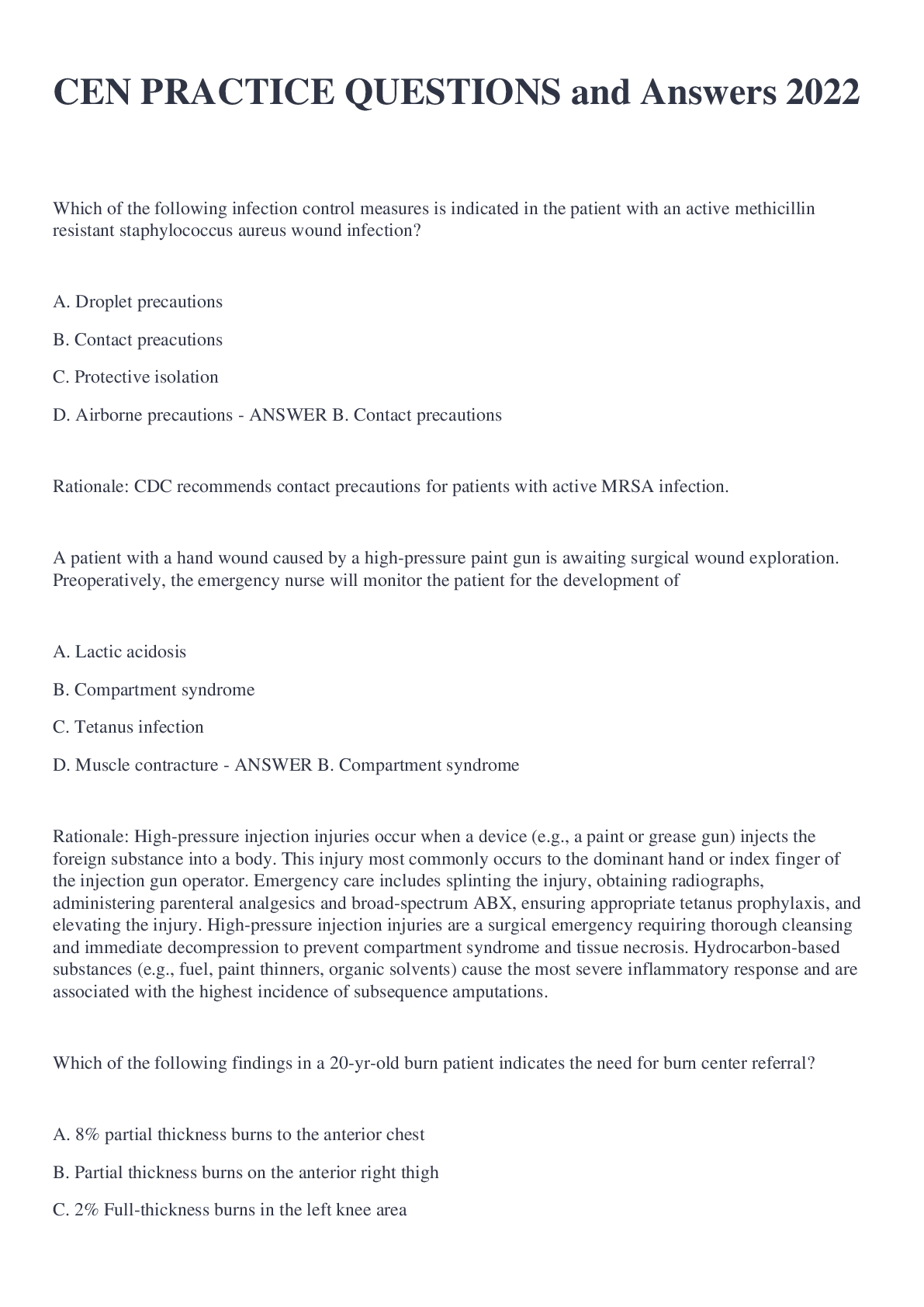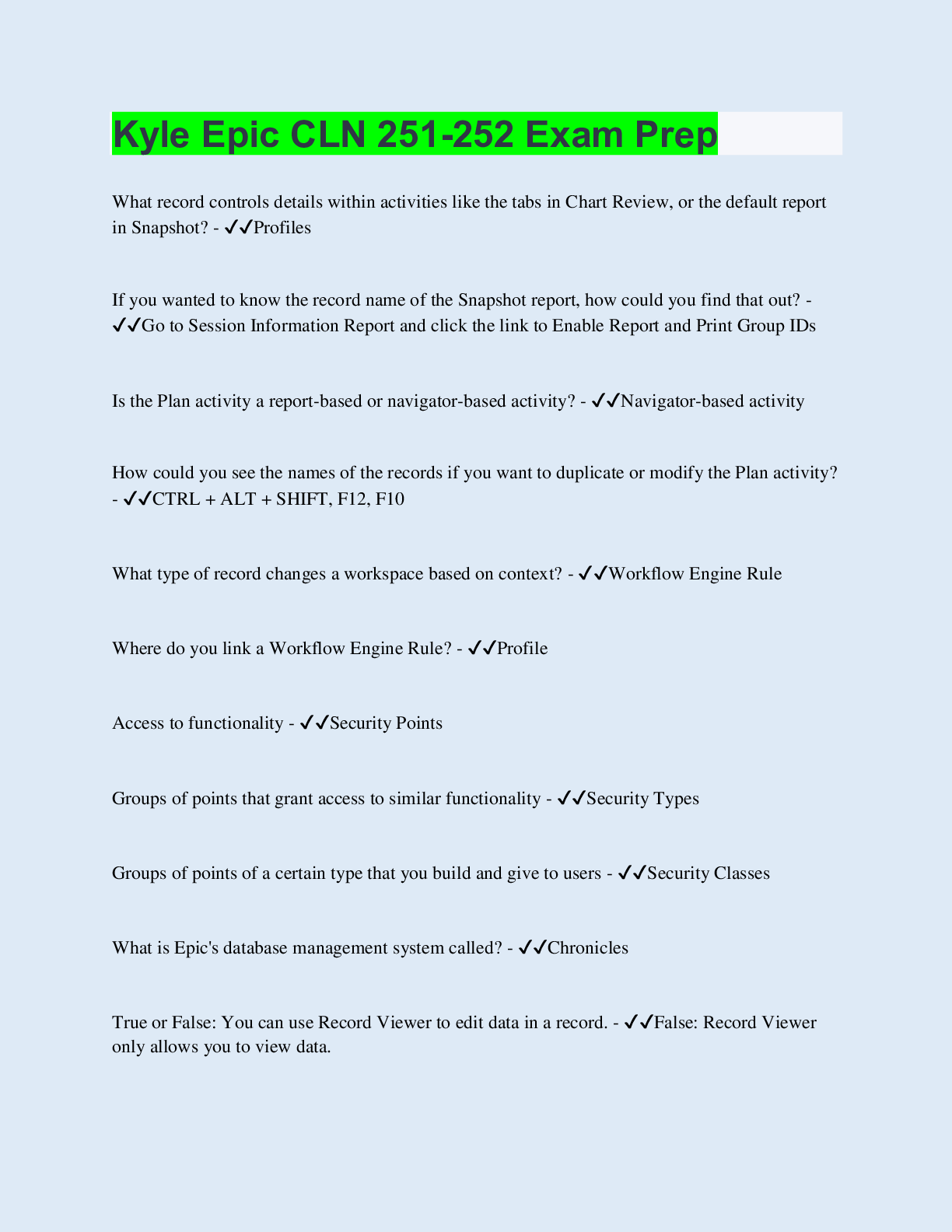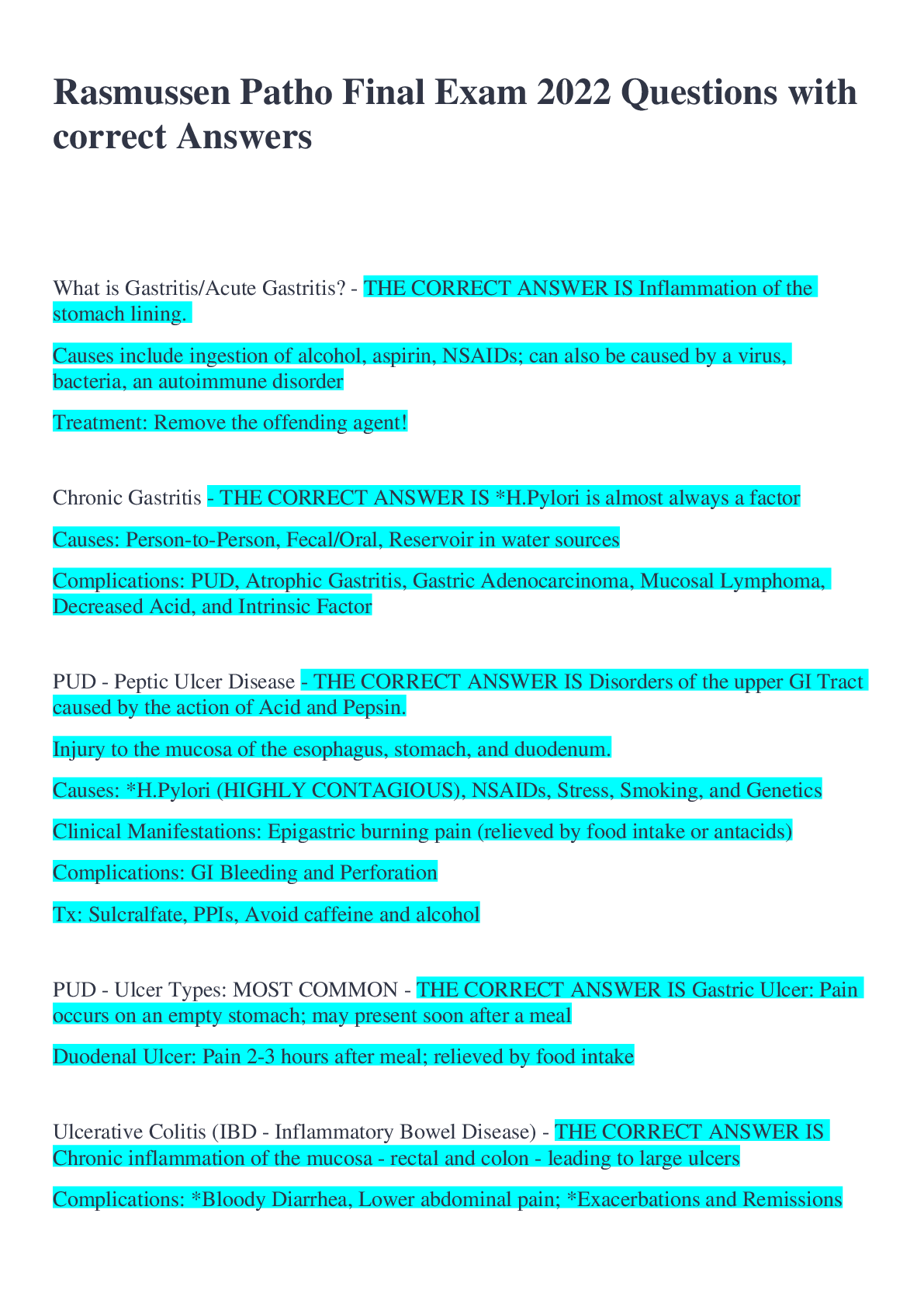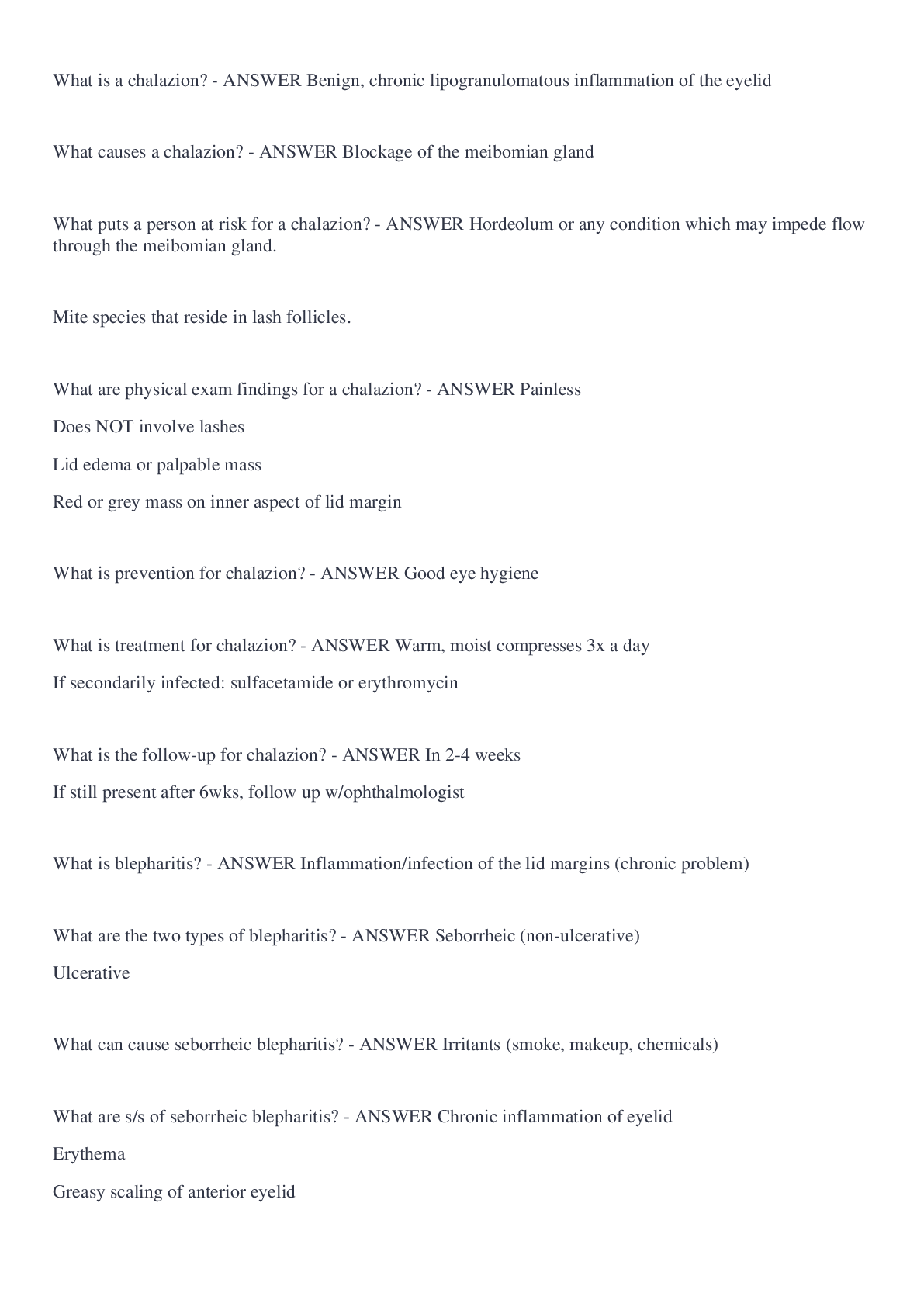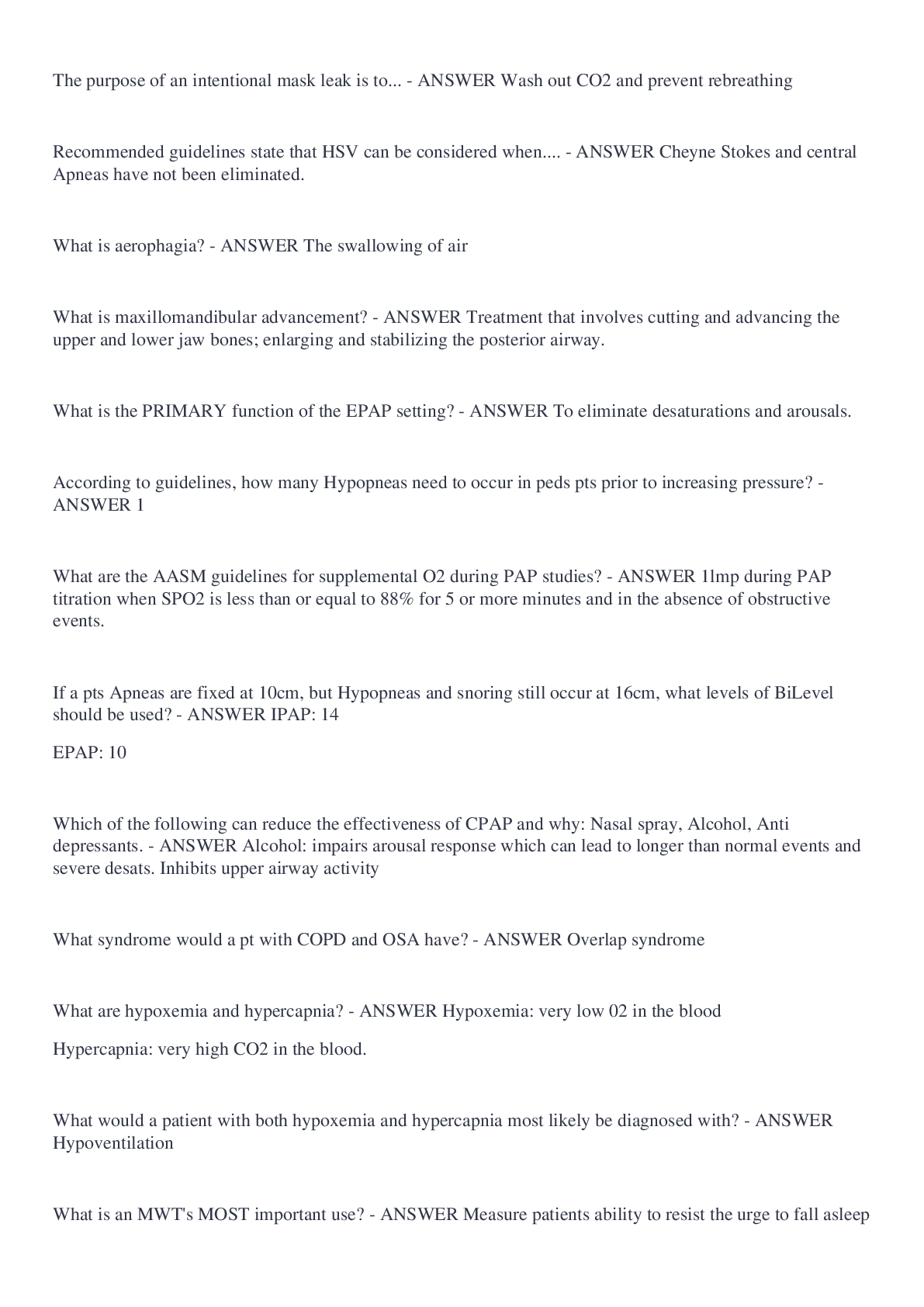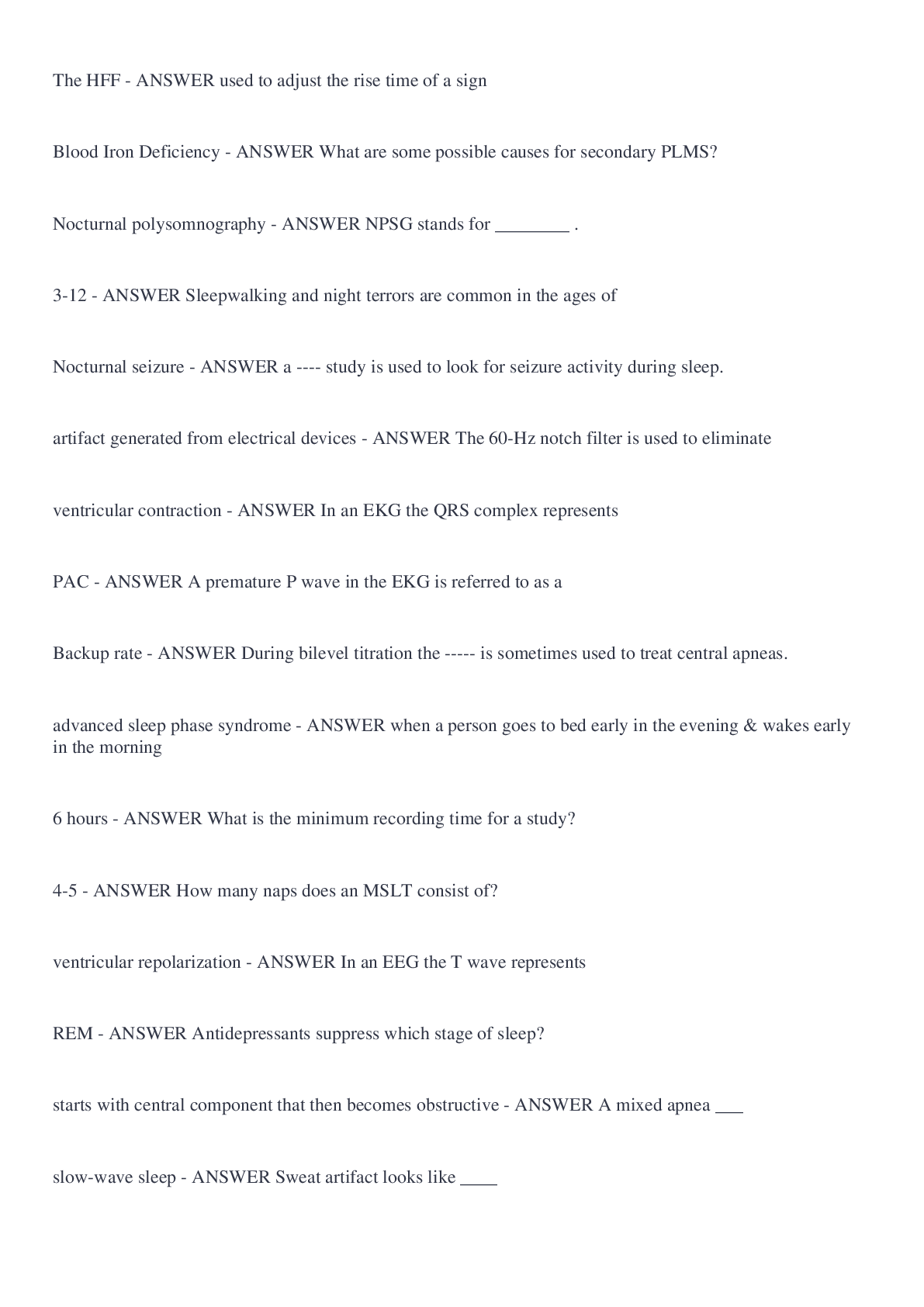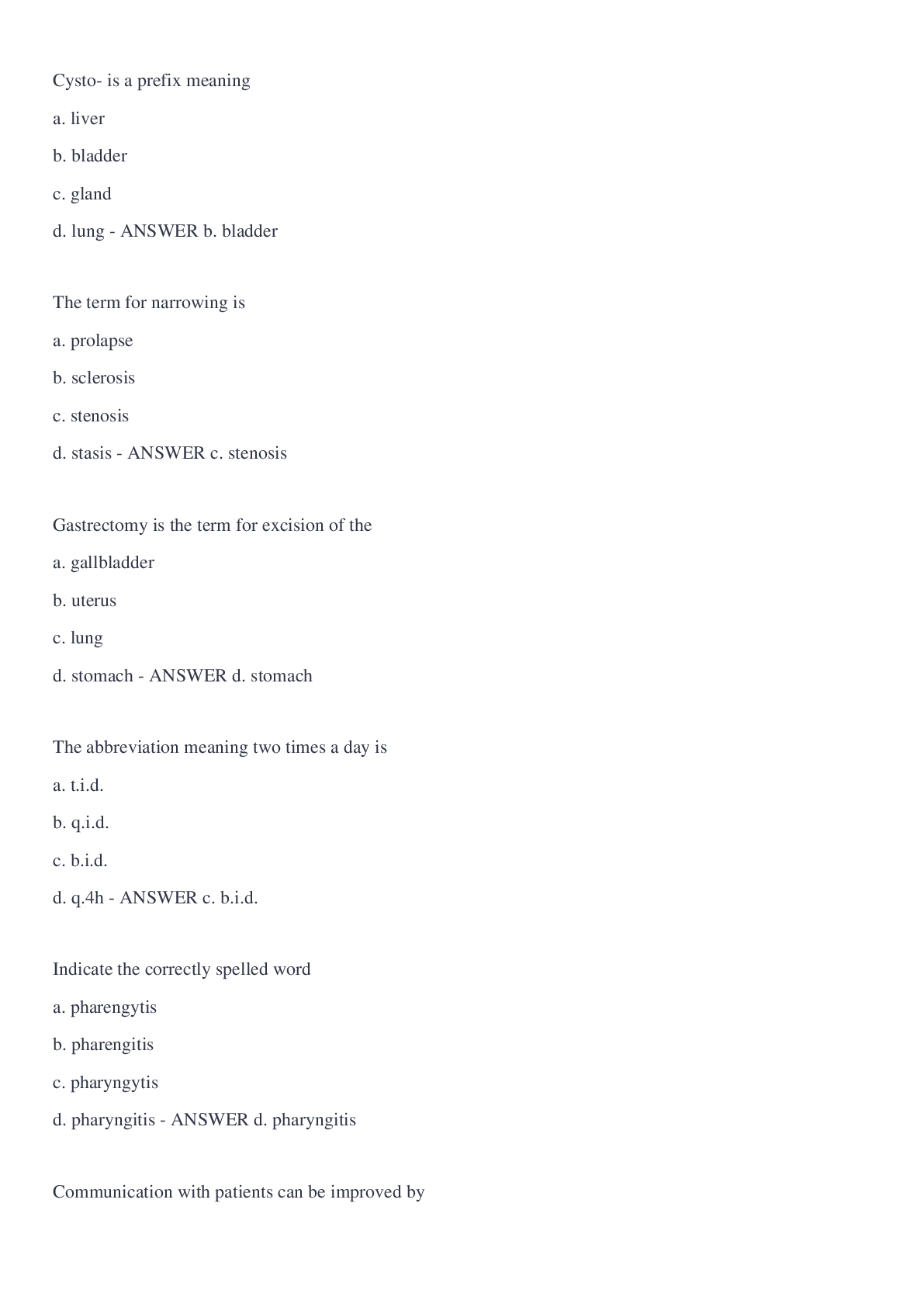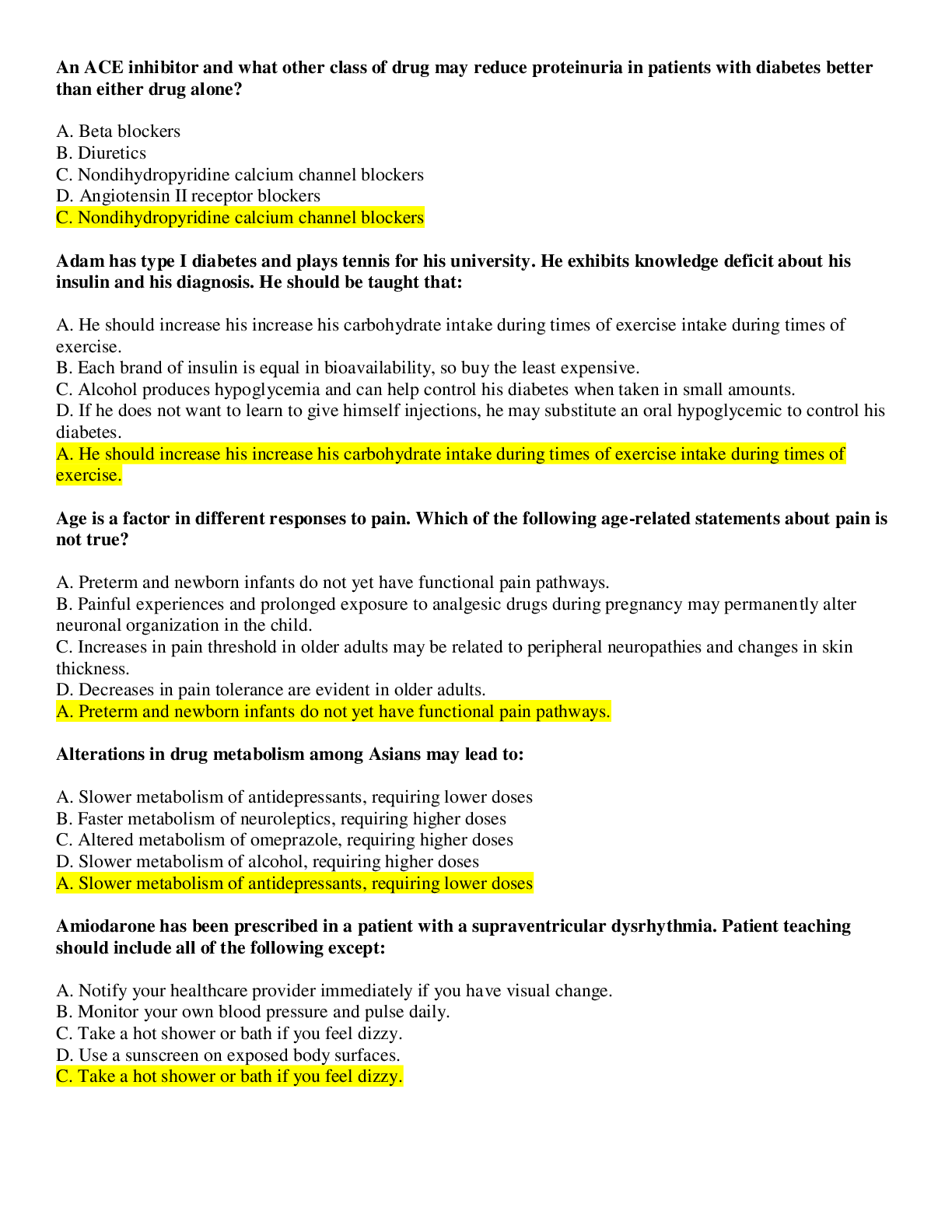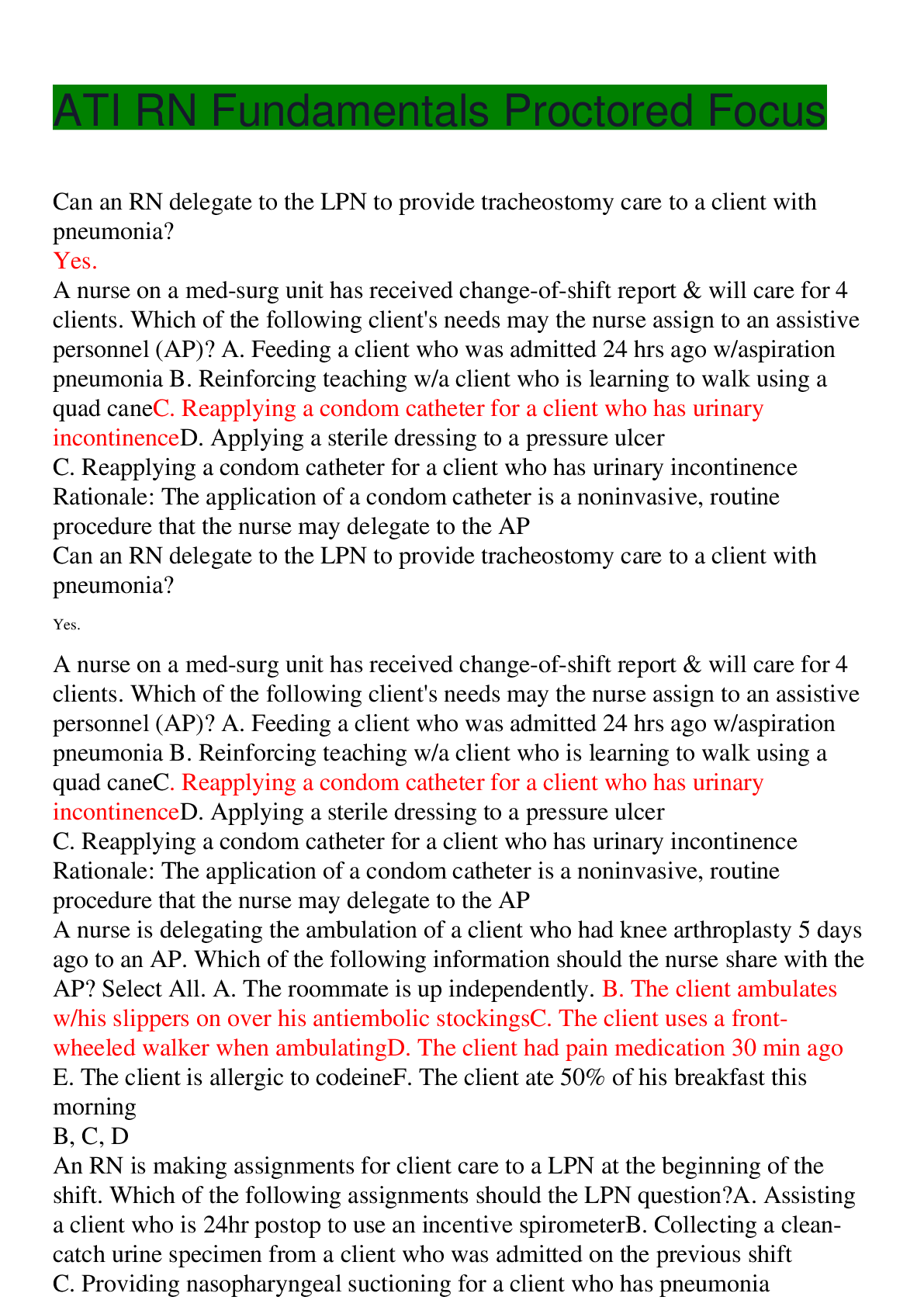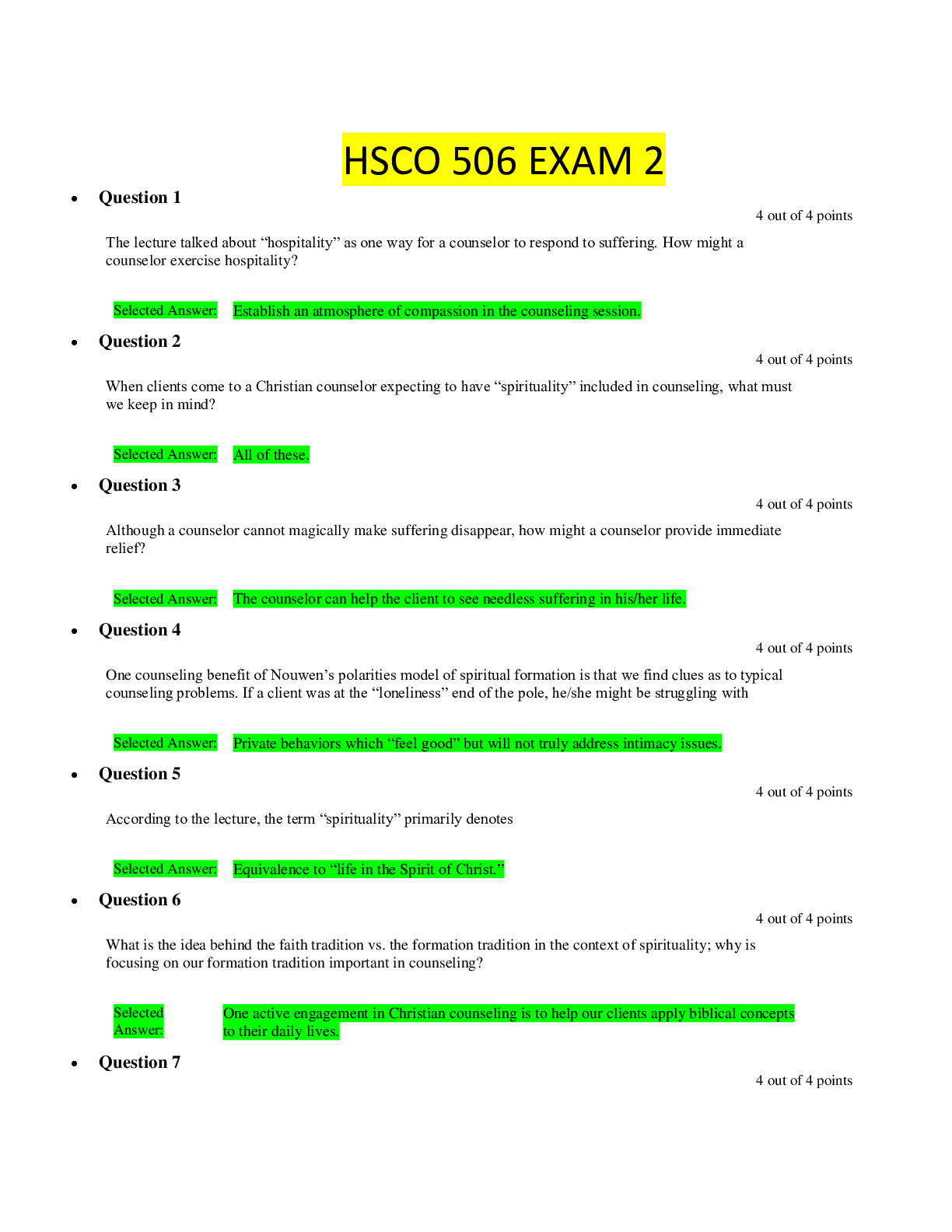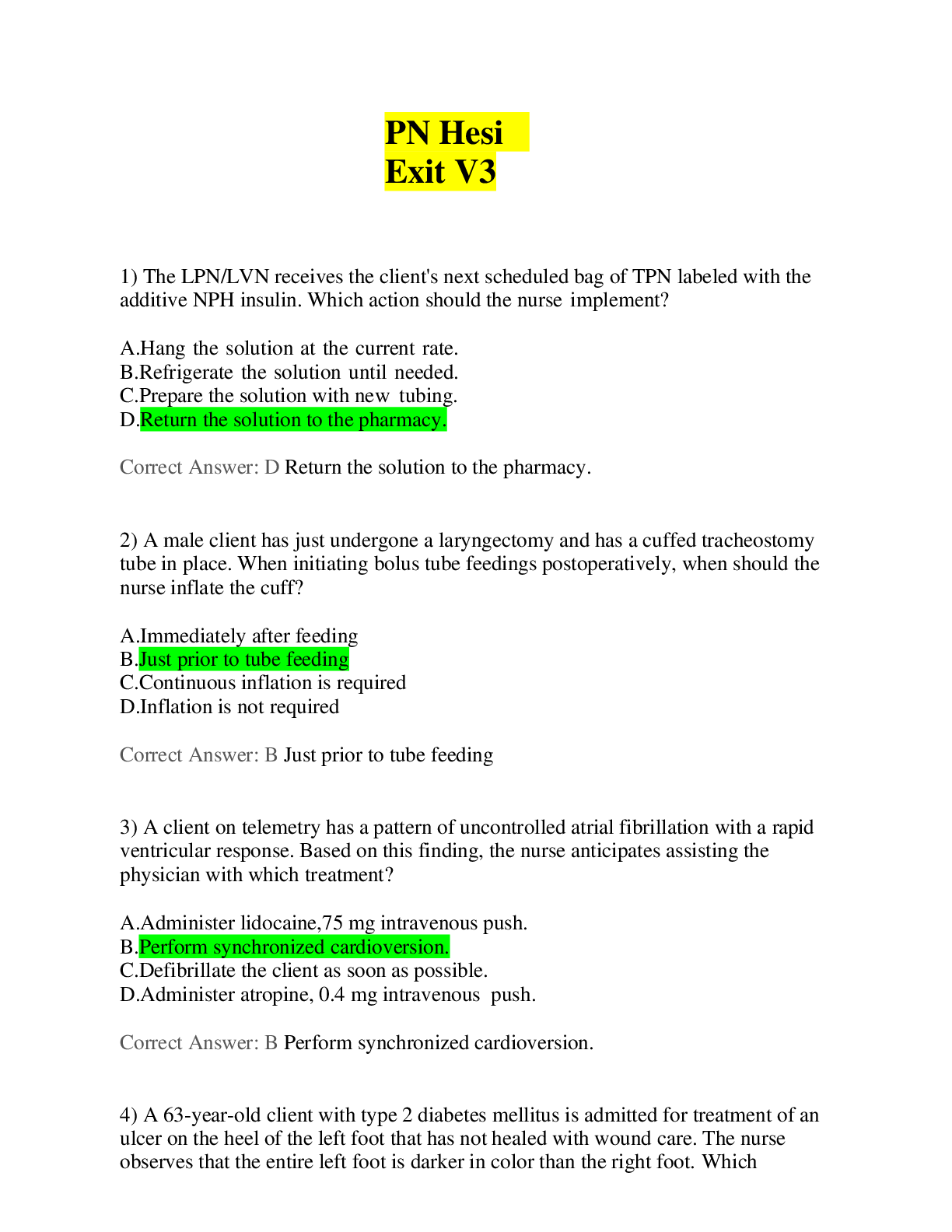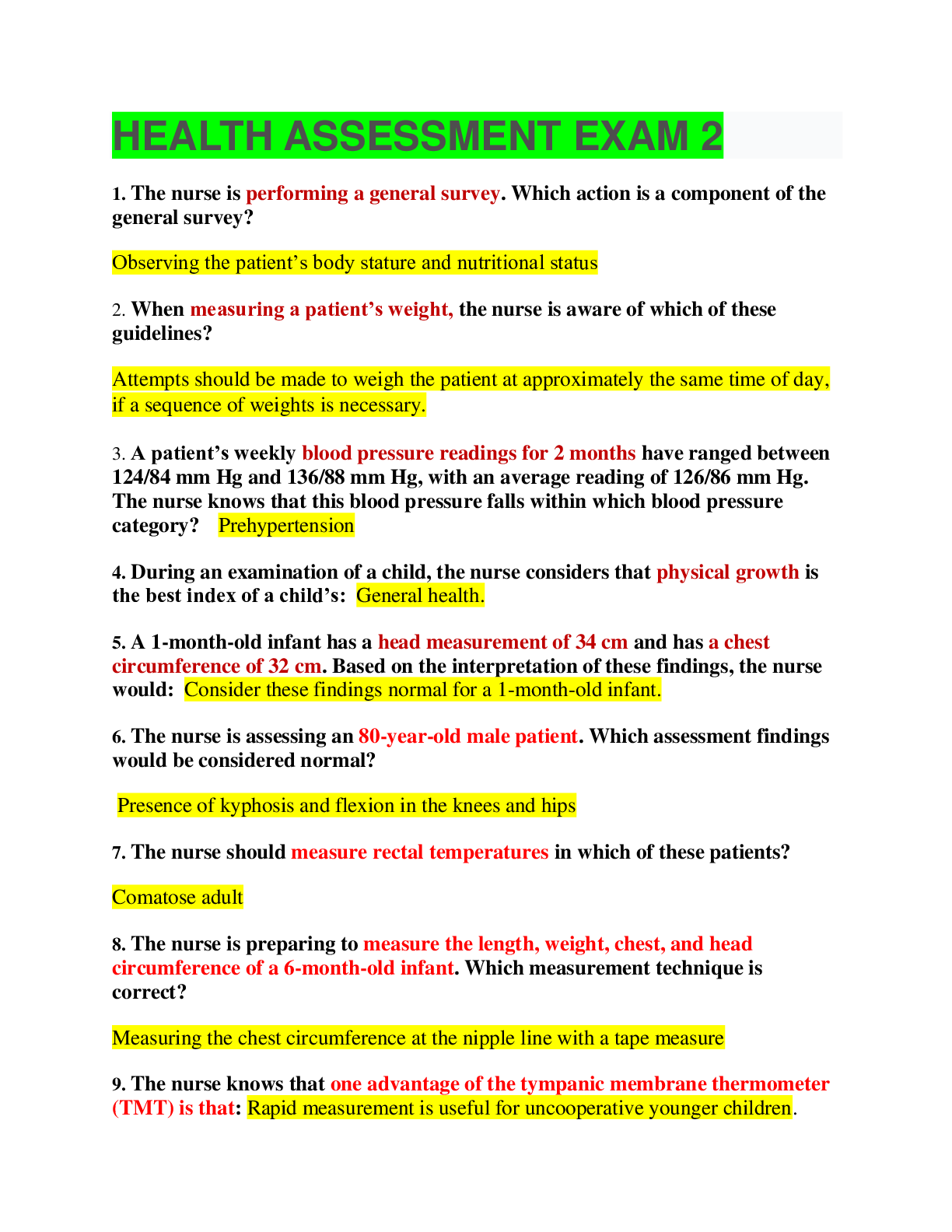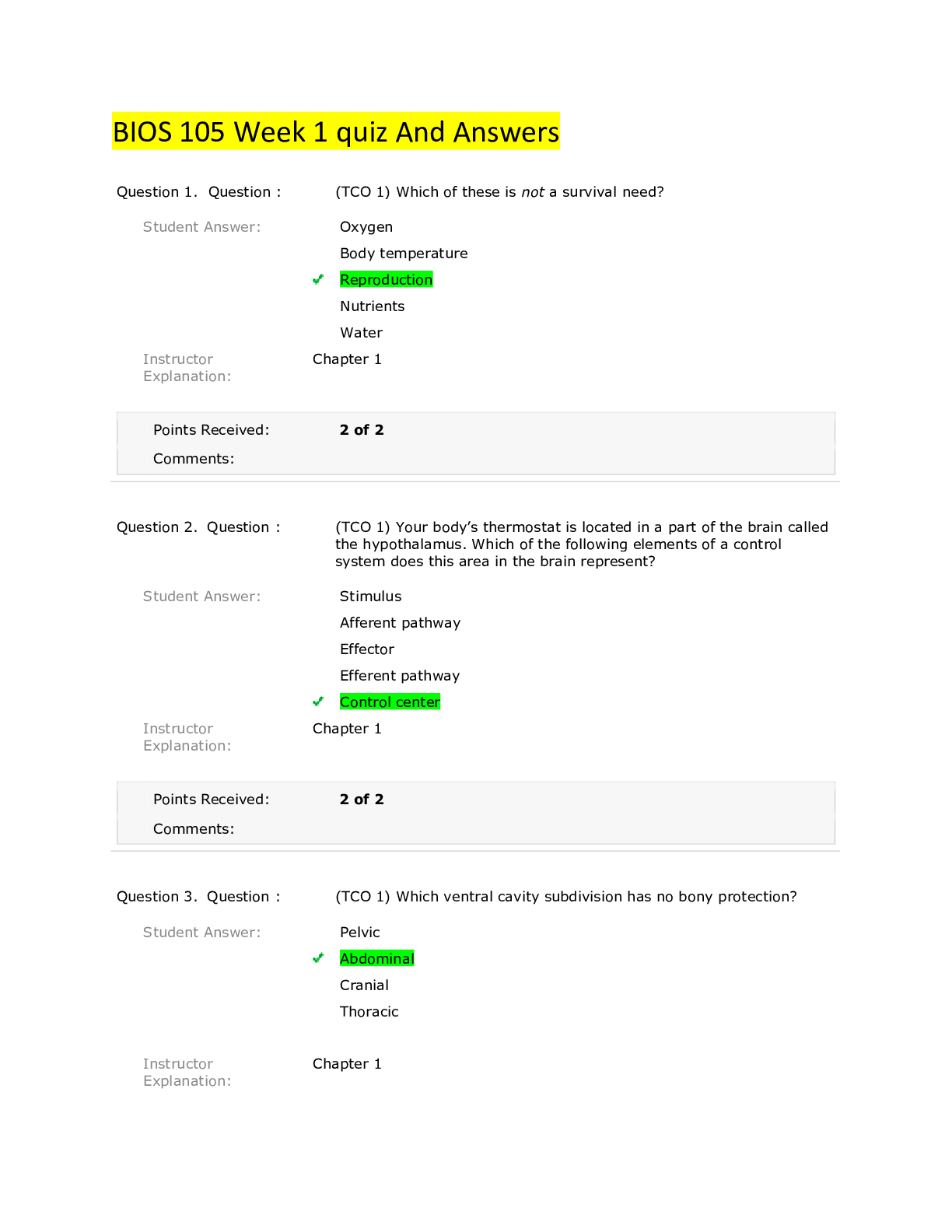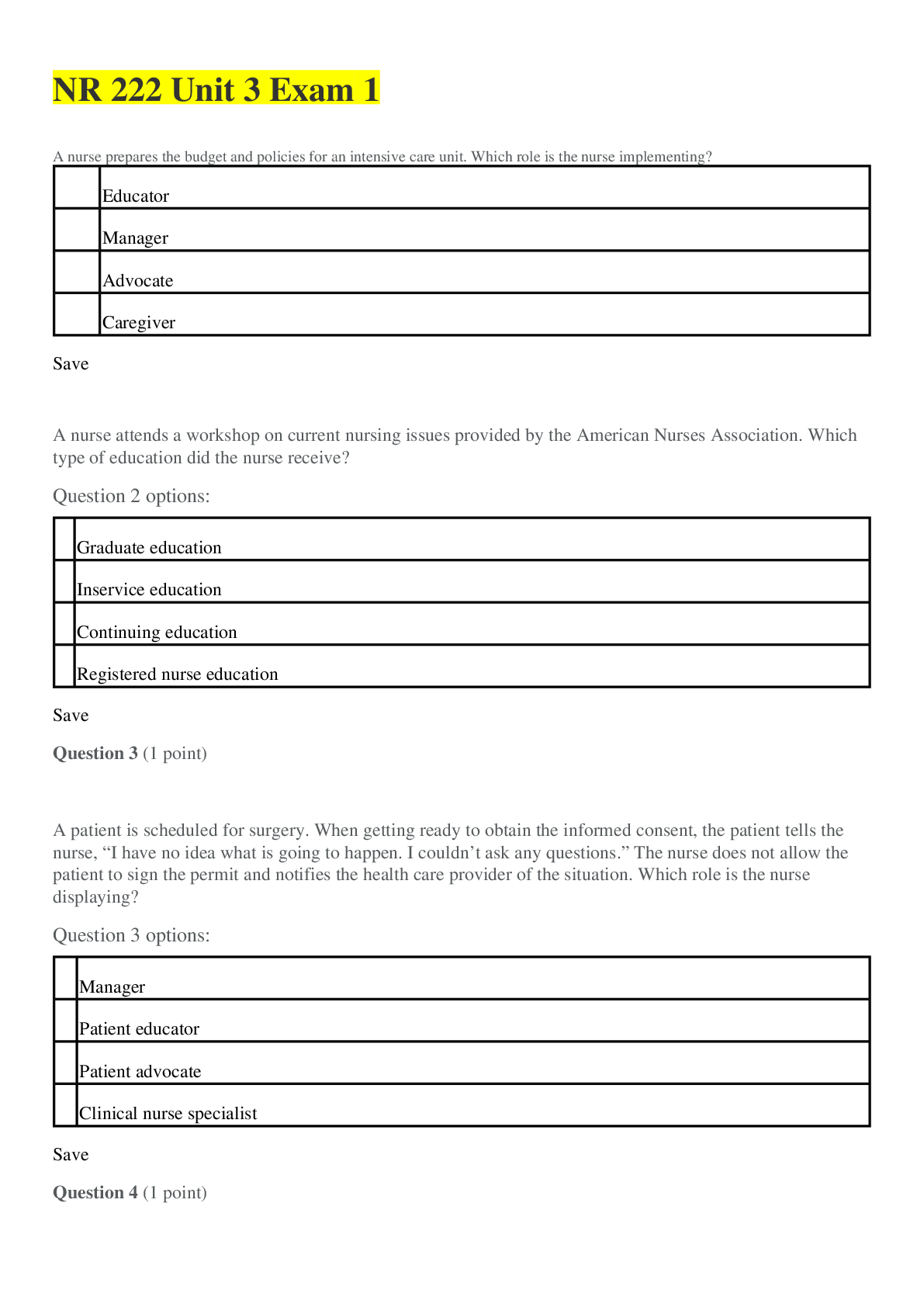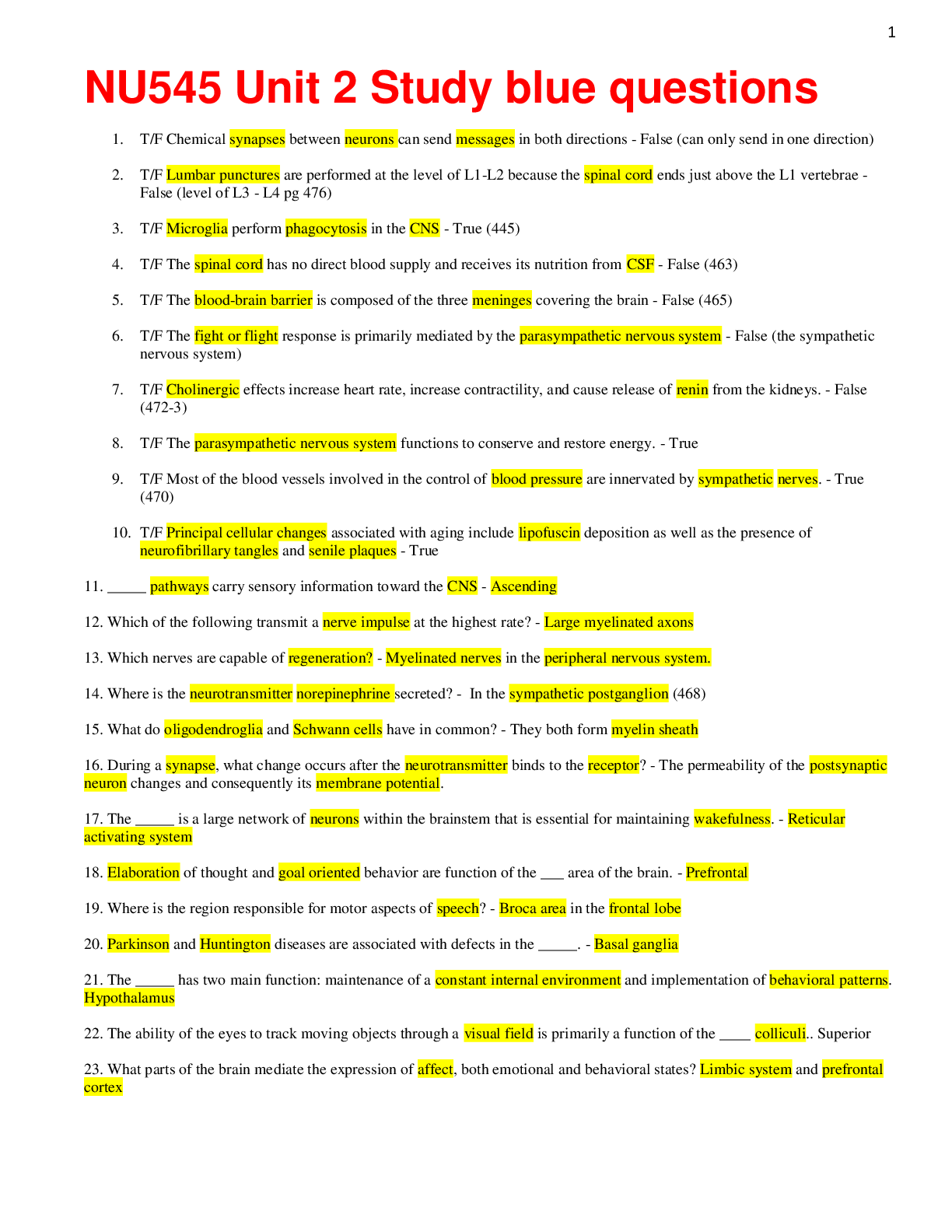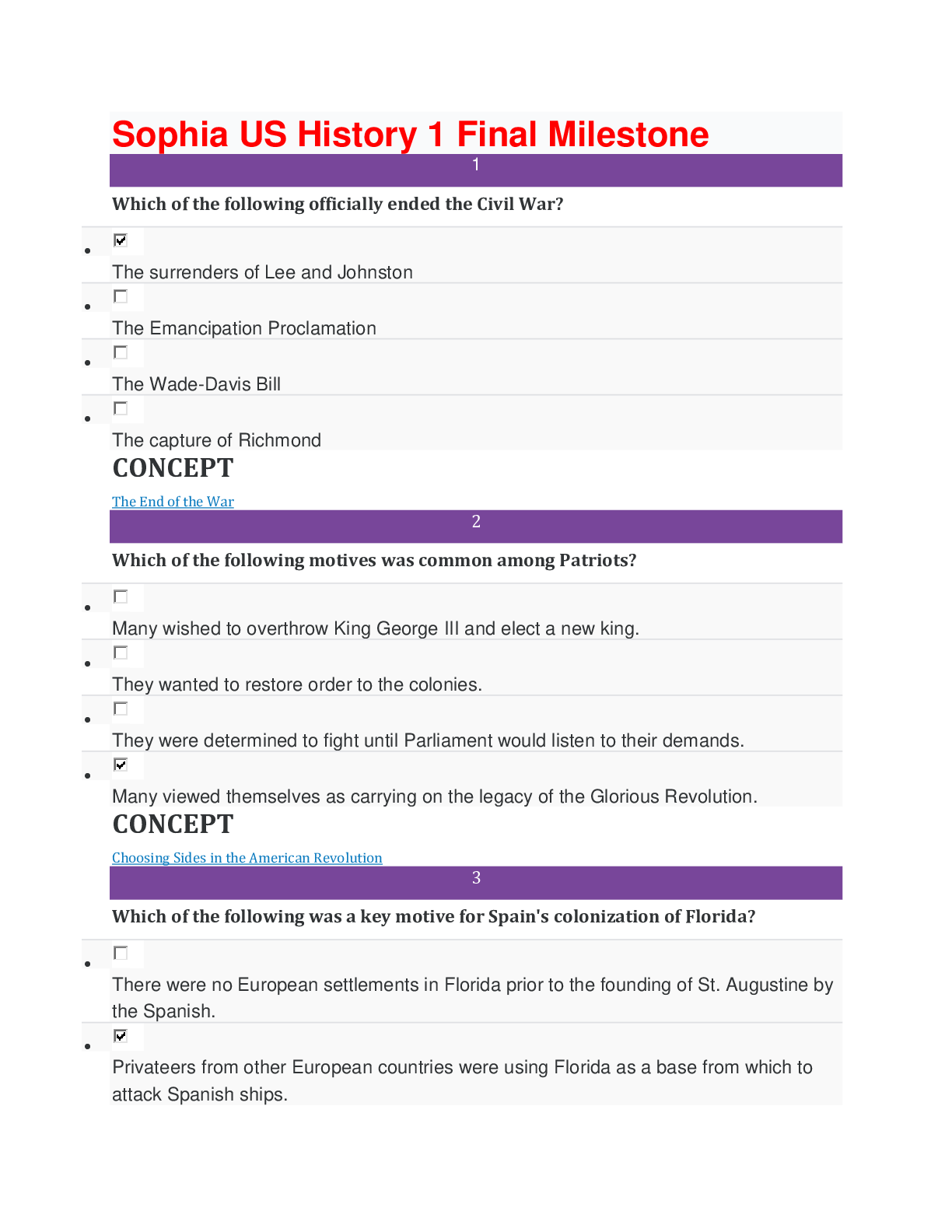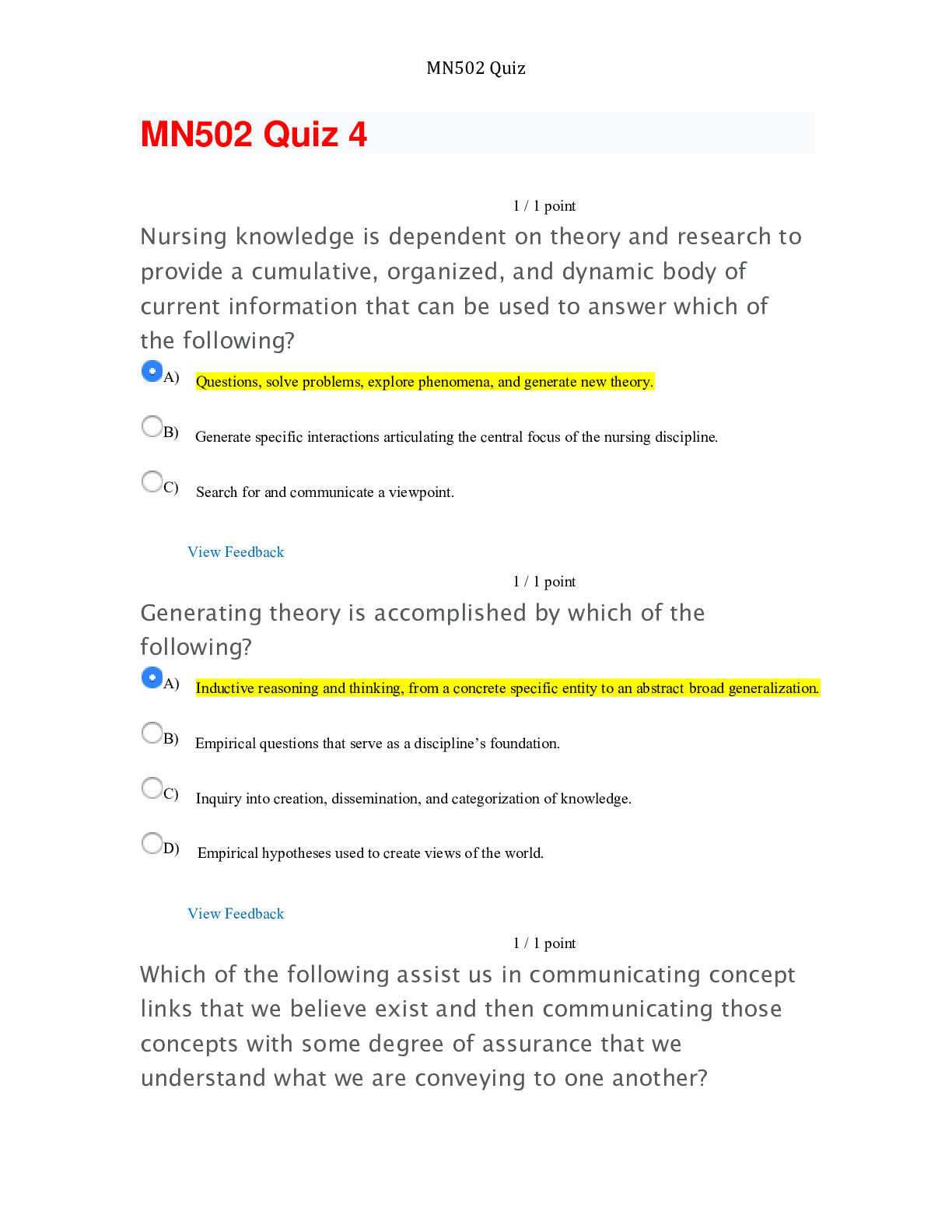AHIP Final Exam Test Questions and Answers latest 2022/2023
Document Content and Description Below
Mrs. West wears glasses and dentures and has enjoyed considerable pain relief from arthritis through massage therapy. She is concerned about whether or not Medicare will cover these items and services... . What should you tell her? a. Medicare covers glasses, but not dentures or massage therapy. b. Medicare does not cover massage therapy, or, in general, glasses or dentures. Correct: Neither Medicare Part A nor Part B covers massage therapy, dentures, or routine eye examinations to prescribe eyeglasses. c. Medicare covers 80% of the cost of these three services. d. Medicare covers 50% of the cost of these three services. Feedback Source: Module 1, Slide - Not Covered by Medicare Part A & B Mr. Capadona would like to purchase a Medicare Advantage (MA) plan and a Medigap plan to pick up costs not covered by that plan. What should you tell him? a. Medigap plans that cover costs not paid for by an MA plan are available only in Massachusetts, Minnesota, and Wisconsin. b. Medigap policies designed to cover costs not paid for by an MA plan can be purchased, but only if the MA plan’s design is considered to be the “defined standard benefit.” c. Medigap plans are a form of Medicare Advantage, so purchasing both would be redundant coverage. d. It is illegal for you to sell Mr. Capadona a Medigap plan if he is enrolled in an MA plan, and besides, Medigap only works with Original Medicare. Correct: The purpose of Medigap plans is to supplement Original Medicare benefits. Medigap plans do not work with Medicare Advantage plans. It is illegal to sell a Medigap plan to someone already in a Medicare Advantage health plan. Feedback Source: Module 1, Slide - Medigap is NOT Mr. Bauer is 49 years old, but eighteen months ago he was declared disabled by the Social Security Administration and has been receiving disability payments. He is wondering whether he can obtain coverage under Medicare. What should you tell him? a. He became eligible for Medicare when his disability eligibility determination was first made. b. After receiving such disability payments for 24 months, he will be automatically enrolled in Medicare, regardless of age. Correct: Individuals with disabilities who are under age 65 are automatically enrolled in Medicare Parts A and B the month after they have received Social Security or Railroad Retirement disability benefits for 24 months. c. Individuals receiving such disability payments from the Social Security Administration continue to receive those payments but only become eligible for Medicare upon reaching age 65. d. Individuals who become eligible for such disability payments only have to wait 12 months before they can apply for coverage under Medicare. Feedback Source: Module 1, Slide - Medicare Enrollment Part A & B Mrs. Peňa is 66 years old, has coverage under an employer plan, and will retire next year. She heard she must enroll in Part B at the beginning of the year to ensure no gap in coverage. What can you tell her? a. She must wait at least 30 days after her employment terminates before she may enroll in Medicare Part B. b. She may enroll at any time while she is covered under her employer plan, but she will have a special eight-month enrollment period after the last month on her employer plan that differs from the standard general enrollment period, during which she may enroll in Medicare Part B. Correct: As long as Mrs. Peňa is covered under her employer’s plan, she can enroll in Part B at any time. If she retires, she will be able to enroll in Part B during a special enrollment period that lasts 8 months following the last month of her employer coverage. c. She may not enroll in Part B while covered under an employer group health plan and must wait until the standard general enrollment period after she retires. d. She may only enroll in Part B during the general enrollment period whether she is retired or not Feedback Source: Module 1, Slide - Enrollment in Parts A & B After the Initial Enrollment Period Mrs. Gonzalez is enrolled in Original Medicare and has a Medigap policy as well, but it provides no drug coverage. She would like to keep the coverage she has but replace her existing Medigap plan with one that provides drug coverage. What should you tell her? a. Mrs. Gonzalez should purchase a K or L Medigap plan. b. Mrs. Gonzalez can purchase a Medigap plan that covers drugs, but it likely won’t offer coverage that is equivalent to that provided under Part D. c. Mrs. Gonzalez cannot purchase a Medigap plan that covers drugs, but she could keep her Medigap policy and enroll in a Part D prescription drug plan. Correct: Individuals who are enrolled in Medigap plans may only obtain Medicare drug coverage (Part D) through a stand-alone prescription drug plan. d. Medigap is a replacement for Original Medicare and she has been paying for double coverage. She should simply drop her Medigap policy. Feedback Source: Module 1, Slide - Beneficiaries with Medigap Plans with Drug Coverage Mrs. Park is an elderly retiree. Mrs. Park has a low fixed income. What could you tell Mrs. Park that might be of assistance? a. She should not sign up for a Medicare Advantage plan. b. She should only seek help from private organizations to cover her Medicare costs. c. She can apply to the Medicare agency for lower premiums and cost-sharing. d. She should contact her state Medicaid agency to see if she qualifies for one of several programs that can help with Medicare costs for which she is responsible. Correct: Mrs. Park can apply for programs through her State Medicaid office that could assist with her Medicare costs, such as Medicare Savings Programs, Part D low-income subsidies, and Medicaid. Feedback Source: Module 1, Slide - Help for Individuals with Limited Income/Resources Mr. Alonso receives some help paying for his two generic prescription drugs from his employer’s retiree coverage, but he wants to compare it to a Part D prescription drug plan. He asks you what costs he would generally expect to encounter when enrolling into a standard Medicare Part D prescription drug plan. What should you tell him? a. He generally would pay only a per-prescription co-payment. Medicare covers all other costs. b. He generally would pay only a monthly premium. Medicare covers all other costs. c. He generally would pay only a monthly premium and deductible. Medicare covers all other costs. d. He generally would pay a monthly premium, annual deductible, and per-prescription cost- sharing. Correct: Costs for Part D beneficiaries typically include a monthly premium, annual deductible, and per-prescription cost-sharing. Feedback Source: Module 1, Slide - Original Medicare and Part D Prescription Drug Coverage. Mr. Patel is in good health and is preparing a budget in anticipation of his retirement when he turns 66. He wants to understand the health care costs he might be exposed to under Medicare if he were to require hospitalization as a result of an illness. In general terms, what could you tell him about his costs for inpatient hospital services under Original Medicare? a. Under Original Medicare, there is a single deductible amount due for the first 60 days of any inpatient hospital stay, after which it converts into a per-day coinsurance amount through day 90. After day 90, he would pay a daily amount up to 60 days over his lifetime, after which he would be responsible for all costs. Correct: Beneficiaries are responsible for a single deductible amount for each benefit period, followed by a per day coinsurance amount through day 90. For day 91 and beyond, there is a charge for each “lifetime reserve day” up to 60 days over a beneficiary’s lifetime. After this, he would be responsible for all costs. b. Under Original Medicare, the inpatient hospital co-payment is a percentage of allowed charges. The percentage increases after 60 days and again after 90 days. c. Under Original Medicare, if the inpatient hospital service is provided by a participating Medicare provider, the co-payment is waived. Co-payments are only charged when a beneficiary opts to receive care from a non-participating provider. d. Under Original Medicare, the inpatient hospital co-payment is a flat per-day amount that remains the same throughout the first 60 days of a beneficiary’s stay. After day 60 the amount gradually increases until day 90. After 90 days he would pay the full amount of all costs. Feedback Source: Module 1, Slide - Medicare Part A - Original Medicare Cost-Sharing for Inpatient Hospital Care Mrs. Chen will be 65 soon, has been a citizen for twelve years, has been employed full time, and paid taxes during that entire period. She is concerned that she will not qualify for coverage under part A because she was not born in the United States. What should you tell her? a. All individuals who are citizens and age 65 or over will be covered under Part A. b. Most individuals who are citizens and age 65 or over and are covered under Part A must pay a monthly premium for that coverage. c. Most individuals who are citizens and age 65 or over and wish to be covered under Part A must enroll in a Medicare Advantage Plan. d. Most individuals who are citizens and age 65 or over are covered under Part A by virtue of having paid Medicare taxes while working, though some may be covered as a result of paying monthly premiums. Correct: Most individuals who are citizens and age 65 or older may qualify for coverage either because they pay a monthly premium or because they paid Medicare taxes while working for a specific duration. Feedback Source: Module 1, Slide - Eligibility for Part A & B Benefits and Slide - Medicare Premiums Part A Agent John Miller is meeting with Jerry Smith, a new prospect. Jerry is currently enrolled in Medicare Parts A and B. Jerry has also purchased a Medicare Supplement (Medigap) plan which he has had for several years. However, the plan does not provide drug benefits. How would you advise Agent John Miller to proceed? a. Tell prospect Jerry Smith that he should keep his Medigap plan but he should supplement his healthcare coverage by purchasing a Medicare Advantage plan that offers prescription drug coverage (MA-PD). b. Tell prospect Jerry Smith that he should consider adding a standalone Part D prescription drug coverage policy to his present coverage. Correct: Agent John Miller can help prospect Jerry select a standalone Part D prescription drug plan that complements his current Original Medicare and Medigap coverage. Alternatively, Agent Miller can suggest that Jerry drop his Medigap coverage and enroll in a MA-PD plan. c. Tell prospect Jerry Smith that he should drop his Medigap coverage and put those premium dollars toward the purchase of a standalone Part D prescription drug plan because he can always reactivate his Medigap policy on a guaranteed issue basis. Furthermore, because he has had Medigap Jerry will not incur a Part D late enrollment penalty. d. Tell prospect Jerry Smith that Medigap is simply a variation of a Medicare Advantage plan and the companies John represents offer more comprehensive coverage for a lower price. Feedback Source: Module 1, Slide - Medigap (Medicare Supplement Insurance) and Slide - Medigap is NOT Mr. Buck has several family members who died from different cancers. He wants to know if Medicare covers cancer screening. What should you tell him? a. Medicare covers all screening tests that have been approved by the FDA on a frequency determined by the treating physician. b. Medicare covers some screening tests that must be performed within the first year after enrollment. Beyond that point expenses for screening tests are the responsibility of the beneficiary. c. Medicare covers the periodic performance of a range of screening tests that are meant to provide early detection of disease. Mr. Buck will need to check specific tests before obtaining them to see if they will be covered. Correct: Original Medicare and Medicare Advantage plans cover most preventive services, such as screening tests, but beneficiaries must confirm coverage of specific tests with their plans. d. Medicare covers treatments for existing disease, injury, and malformed limbs or body parts. As such, it does not cover any screening tests and these must be paid for by the beneficiary out-of-pocket. Feedback Source: Module 1, Slide - Medicare Part B Benefits - Preventive Services and Screenings Juan Perez, who is turning age 65 next month, intends to work for several more years at Smallcap, Incorporated. Smallcap has a workforce of 15 employees and offers employer- sponsored healthcare coverage. Juan is a naturalized citizen and has contributed to the Medicare system for over 20 years. Juan asks you if he will be entitled to Medicare and if he enrolls how that will impact his employer-sponsored healthcare coverage. How would you respond? Correct: a. Juan is likely to be eligible for Medicare once he turns age 65 and if he enrolls Medicare would become the primary payor of his healthcare claims and Smallcap does not have to continue to offer him coverage comparable to those under age 65 under its employer- sponsored group health plan. b. Juan is likely to be eligible for Medicare once he turns age 65 and if he enrolls Medicare would become the primary payor of his healthcare claims but Smallcap must continue to offer him coverage under its employer-sponsored group health plan and would become a secondary payor. Incorrect: small GHPs do not have to continue to offer their age 65 and over employees and their spouses the same benefits under the GHP as individuals under age 65. Nor do they have to offer such coverage under the same conditions as for individuals under age 65. c. Juan is likely to be ineligible for Medicare since he was born outside the United States and has only contributed to the Medicare system for 20 years. d. Juan is likely to be eligible for Medicare once he turns age 65 and if he enrolls his employer- sponsored coverage would continue to be the primary payor while Medicare would be considered a secondary payor of his healthcare claims. Feedback Source: Module 1, Slide - Eligibility for Part A and Part B Benefits and Slide - Medicare for Individuals Who Are Still Working - Small GHPs and Slide - Medicare Coordination with Employer Group Health Plans Mr. Xi will soon turn age 65 and has come to you for advice as to what services are provided under Original Medicare. What should you tell Mr. Xi that best describes the health coverage provided to Medicare beneficiaries? a. Beneficiaries under Original Medicare have no cost-sharing for most preventive services which include immunizations such as annual flu shots. Correct: Beneficiaries enrolled in both Original Medicare (Parts A and B) have no cost-sharing for most preventive services. These services include immunizations such as annual flu shots. b. Medicare Part A generally covers medically necessary physician and other health care professional services. c. Benefits covered by Medicare Parts A and B include routine dental care, hearing aids, and routine eye care. d. Medicare Part B generally provides prescription drug coverage. Feedback Source: Module 1, Slide - Medicare Part A & B Benefits, Slide - Medicare Part B Benefits: Preventive Services and Screening, and Slide - Not Covered by Medicare Part A & B Mr. Schmidt would like to plan for retirement and has asked you what is covered under Original Fee-for-Service (FFS) Medicare? What could you tell him? a. Part C, which always covers dental and vision services, is covered under Original Medicare. b. Part A, which covers hospital, skilled nursing facility, hospice, and home health services and Part B, which covers professional services such as those provided by a doctor are covered under Original Medicare. Correct: Original Medicare consists of Part A and Part B. c. Part A, which covers long-term custodial care services, is covered under Original Medicare. d. Part D, which covers prescription drug services, is covered under Original Medicare. Feedback Source: Module 1, Slide - Overview of Medicare Benefits and Coverage - Parts A, B, C, and Slide - Overview of Different Ways to Get Medicare Mr. Davis is 52 years old and has recently been diagnosed with end-stage renal disease (ESRD) and will soon begin dialysis. He is wondering if he can obtain coverage under Medicare. What should you tell him? a. He may sign-up for Medicare at any time however coverage usually begins on the sixth month after dialysis treatments start. b. He may not sign-up for Medicare until he reaches age 62, the date he first becomes eligible for Social Security benefits. c. He may sign-up for Medicare at any time and coverage usually begins immediately. d. He may sign-up for Medicare at any time however coverage usually begins on the fourth month after dialysis treatments start. Correct: Individuals with ESRD may sign up for Medicare at any time. Coverage typically begins on the fourth month after dialysis treatments start, but it could be earlier if certain conditions are met. Feedback Source: Module 1, Slide - Medicare Enrollment Part A & B Mr. Moy's wife has a Medicare Advantage plan, but he wants to understand what coverage Medicare Supplemental Insurance provides since his health care needs are different from his wife’s needs. What could you tell Mr. Moy? a. Medicare Supplemental Insurance would cover his long-term care services. b. Medicare Supplemental Insurance would help cover his Part A and Part B deductibles or coinsurance in Original Fee-for-Service (FFS) Medicare as well as possibly some services that Medicare does not cover. Correct: Medicare Supplement Insurance (Medigap) fills "gaps" in Original Medicare coverages, such as all or part of the deductibles or coinsurance as well as possibly offering some services such as medical care when a beneficiary travels outside the United States. c. Medicare Supplemental Insurance would cover all of his IRS approved health care expenditures not covered under Original Fee-for-Service (FFS) Medicare. d. Medicare Supplemental Insurance would cover his dental, vision and hearing services only. Feedback Source: Module 1, Slide - Medigap (Medicare Supplement Insurance) Ms. Moore plans to retire when she turns 65 in a few months. She is in excellent health and will have considerable income when she retires. She is concerned that her income will make it impossible for her to qualify for Medicare. What could you tell her to address her concern? a. Medicare is a program for people of all ages with specific mental health disabilities. Since she is in excellent health, she would not qualify, but should instead look into her state’s Medicaid program if she wants further coverage. b. Eligibility for Medicare is based on whether or not a person has ever been employed by the federal government. If she or her husband were ever employed by the federal government, she can enroll in Medicare. c. Medicare is a program for people age 65 or older and those under age 65 with certain disabilities, end-stage renal disease, and Lou Gehrig’s disease so she will be eligible for Medicare. Correct: Individuals that meet these criteria may be eligible to participate in Medicare. It is not based on income. d. Medicare is a program for people who have incomes and assets below specific limits, so you will have to find out her exact financial situation before telling her whether she can obtain Medicare coverage. Feedback Source: Module 1, Slide - Eligibility for Part A and Part B Benefits Mr. Rainey is experiencing paranoid delusions and his physician feels that he should be hospitalized. What should you tell Mr. Rainey (or his representative) about the length of an inpatient psychiatric hospital stay that Medicare will cover? a. Medicare will cover a total of 190 days of inpatient psychiatric care during Mr. Rainey’s entire lifetime. Correct: Medicare Part A provides coverage for inpatient psychiatric care for up to 190 lifetime days. b. Medicare will cover, at its allowable amount, as many stays as are needed throughout Mr. Rainey’s life, as long as no single stay exceeds 190 days. c. Inpatient psychiatric services are not covered under Original Medicare. d. Medicare inpatient psychiatric coverage is limited to the same number of days covered for typical inpatient stays. Feedback Source: Module 1, Slide - Medicare Part A provides coverage for inpatient psychiatric care for up to 190 lifetime days. Ms. Henderson believes that she will qualify for Medicare Coverage when she turns 65, without paying any premiums, because she has been working for 40 years and paying Medicare taxes. What should you tell her? a. She is correct because she will be covered under Part A, without paying premiums and she has worked for 40 years so she will not have to pay Part B premiums. b. Medicare beneficiaries only pay a Part B premium if they are enrolled in a Medicare Advantage plan. c. She is correct that she will not have to pay a premium because State programs cover the cost of Part B premiums for all Medicare beneficiaries. [Show More]
Last updated: 1 year ago
Preview 1 out of 50 pages

Buy this document to get the full access instantly
Instant Download Access after purchase
Add to cartInstant download
We Accept:

Reviews( 0 )
$10.00
Document information
Connected school, study & course
About the document
Uploaded On
Aug 14, 2022
Number of pages
50
Written in
Additional information
This document has been written for:
Uploaded
Aug 14, 2022
Downloads
0
Views
62

